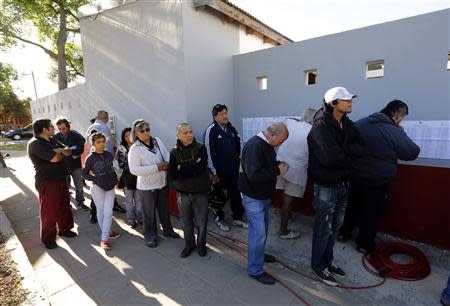Argentina's ailing president faces tough midterm congressional election
By Hugh Bronstein BUENOS AIRES (Reuters) - Argentine President Cristina Fernandez is expected to lose some of her congressional clout in Sunday's midterm election as the ailing leader faces complaints over galloping consumer prices and a weakening currency. Re-elected in 2011 on promises of increasing state control of Latin America's No. 3 economy, Fernandez's political coattails have been trimmed by inflation, clocked by private economists at 25 percent, while heavy-handed currency controls and falling central bank reserves dent confidence. Voters went to the polls under sunny Southern Hemisphere skies to choose half of the lower house of Congress and a third of the Senate in Sunday's vote. The election marks 30 years of democracy following Argentina's 1976-1983 military dictatorship. Fernandez was unable to campaign for her congressional candidates since an October 8 operation to remove blood that pooled on her brain after she fell and hurt her head in August. She is expected to continue convalescing for another few weeks. The surgery marked the latest in a series of health issues for the 60-year-old leader, including low blood pressure and a thyroid tumor that also was surgically removed. Candidates backed by Fernandez won just 26 percent of the vote in the August midterm primary, half of what her alliance got in 2011, and her handpicked congressional candidate did poorly in the key province of Buenos Aires. Some legislators had said they wanted a constitutional amendment to allow her to run for a third term. But a poor showing by Fernandez's branch of the Peronist party in the primary dashed those hopes. To push through the legislation, they would need two-thirds support in both houses. Unless Fernandez's forces defy the opinion polls and clinch a strong congressional majority, the outcome will trigger a succession struggle ahead of the 2015 presidential election. HIGH STAKES At play on Sunday and in 2015 is the policy stance of one of the world's top grains exporters as the country struggles to keep up with rising world food demand and attract investment needed to exploit vast shale oil and gas resources in Patagonia. Argentina's peso weakened past 10 to the U.S. dollar in informal trade last week, widening its breach with the formal rate of 5.88 pesos per greenback. Central bank international reserves are at $34 billion, down from $43 billion in January. But stocks and bonds have rallied on hopes of market-friendly policy changes ahead. The blue-chip Merval stock index is up nearly 50 percent since the August 12 primary, and analysts see more gains if Fernandez's candidates get thumped again on Sunday. Presidential hopeful Sergio Massa, the business-friendly mayor of Tigre, near the capital, could broaden his advantage in opinion polls over rival Martin Insaurralde, Fernandez's handpicked candidate in the key province of Buenos Aires. Massa and Insaurralde head lists of candidates whose fortunes will rise or fall according to the votes won by the two opposing political chieftains. The midterm will also test the support of presidential hopefuls Julio Cobos, a Radical Party member from Mendoza; Hermes Binner, a socialist from Santa Fe; Buenos Aires Governor Daniel Scioli, an ally of the president despite his market-friendly views; and the capital city's mayor, Mauricio Macri. "We are working toward 2015, of course," Macri told local television Sunday morning. "Tomorrow, we start with a new political map." (Additional reporting by Alejandro Lifschitz; Editing by Xavier Briand and Eric Walsh)



